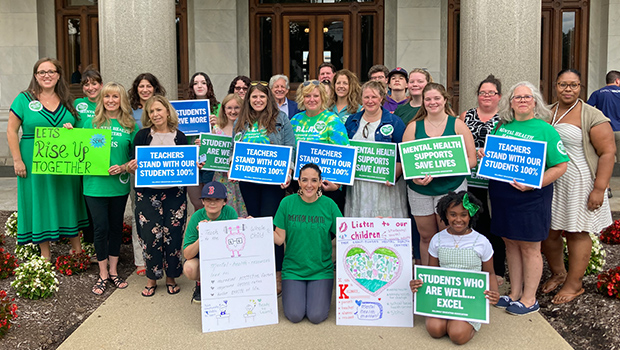Killingly teachers and families are celebrating a major victory as students finally gain access to the mental health services they have long been fighting for. The news comes after a two-year investigation by the Connecticut State Department of Education (CSDE) into the Killingly Board of Education’s refusal to provide essential mental health care for students.
“The choice that a handful of local elected officials made to withhold these services was unconscionable, and we’re relieved that our students will no longer be cut off from the supports every child and adolescent deserves,” said CEA President Kate Dias, adding, “This should never have been a battle in the first place. When you cut students off from fundamental social, emotional, and behavioral resources, you can be sure their teachers will challenge you every step of the way.”
Access denied
The problem began in 2022, when the Killingly BOE—in a 6-3 vote along party lines—refused the superintendent’s plan to establish a mental health center at the high school. The clinic, thanks to federal funding, would have come at no cost to the district.
Students, parents, teachers, and community members were stunned at the BOE’s refusal. An alarming percentage of Killingly students surveyed the prior year acknowledged significant mental health challenges, including thoughts of self-harm and suicidal ideation. Only one school psychologist served the entire 2,300-student district, which had multiple vacancies for social workers, counselors, behavior specialists, social emotional learning specialists, and special education paraprofessionals. And for many families, accessing mental health professionals in their rural community was a struggle.
“We have families without vehicles, and single-parent households where the need to bring home a paycheck and feed the family means that parent can’t take time off work to take their child to doctors’ appointments,” high school English language arts teacher and Killingworth Education Association President Nicola Able pointed out. “Those families deserve our support.”
Able and others asked the town’s BOE to reconsider, especially since many students were in crisis. When those pleas fell on deaf ears, the community—with help from CEA—stepped up its efforts.
Mental health matters
Teachers rallied in Killingly, wore green Mental Health Matters T-shirts every Wednesday, and spoke up at Killingly BOE meetings, even when the health center was not on the agenda. A CEA-organized press conference at the State Capitol continued to draw public attention to the matter. Community members also filed a formal complaint with the State Board of Education, which launched an investigation. At a series of SBE hearings, parents, educators, and others testified to the need for school-based mental health services.
Addressing the State Board of Education, KEA’s Able described the crisis facing Killingly students.
“Too many students are failing to reach their full academic potential because of personal mental health concerns,” she explained. “We see students who are crying or shaking from panic attacks. We see high-performing students who are crumbling under the pressure of expectations. We see students who have difficulty even coming to school. Mental health is undeniably linked to academic success. It is incredibly difficult for anyone dealing with untreated mental health issues to learn.”
CEA President Kate Dias, who has worked in a district with a school-based mental health center and has seen firsthand how vital those supports are, also spoke before the SBE, urging action to help Killingly students.
“Looking at the unmet needs of these students is devastating,” she said.
Long-term plan
In addition to speaking out, Killingly voters organized and were successful at flipping the makeup of their local board of education at election time. Its members now predominantly favor school-based mental health supports, and thanks to the state’s investigation, which concluded this summer, those resources will be in place this coming school year.
In a scathing criticism of the previous Board’s actions, CSDE Director of Legal and Governmental Affairs Mike McKeon noted, “The Killingly Board engaged in a systemic refusal to provide any [mental health] interventions despite indisputable evidence that they’re required. One would expect that a district would do its best to address these needs and provide a safe school setting under state law. This Board refused to take action.”
What’s next?
Killingly’s current Board of Education has agreed to an arrangement with Community Health Resources, which will provide expanded, full-time mental health services at Killingly High School and Killingly Intermediate School and part-time services at Killingly Memorial School. The agreement also includes enhanced outreach efforts by CHR to inform families about the available services. The CSDE will continue to monitor the implementation of these services to ensure they meet required standards and effectively address the needs of Killingly students.
“We have an opportunity to help our students, and we are relieved that barriers to that assistance have been taken down,” says Able. “With the right supports in place, our students can thrive.”







